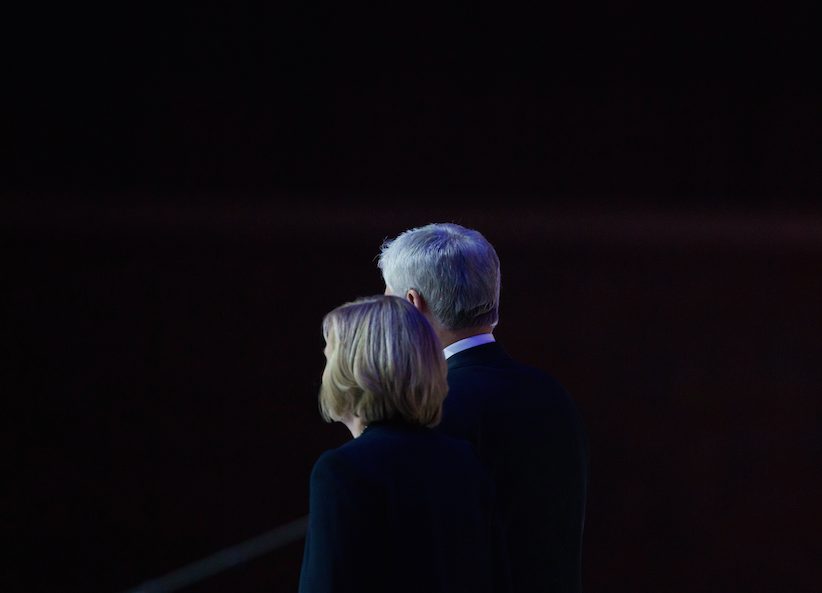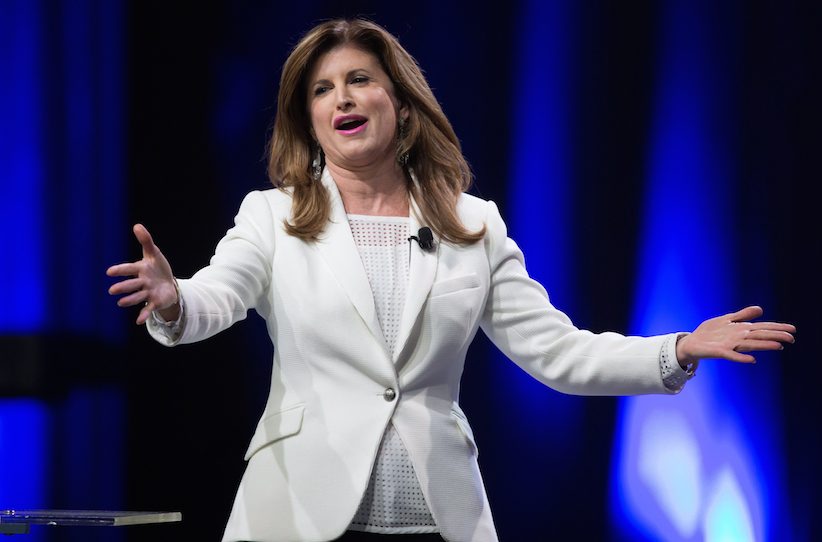Stephen Harper’s exit: One last thanks to party faithful
Address to Conservative convention included repeated nods to what will surely be Harper’s most lasting legacy: Party unity
Former prime minister Stephen Harper, back, and his wife Laureen Harper walk on stage for his address to delegates during the 2016 Conservative Party Convention in Vancouver, B.C. on Thursday May 26, 2016. THE CANADIAN PRESS/Darryl Dyck
Share

A half-year ago, the last time Stephen Harper spoke publicly, the then-outgoing prime minister’s speech was remarkable for what it did not do. And again last night, in what was surely the last speech of his political career, and one explicitly billed as a “farewell,” Harper did the same thing he did on election night last October, offering nothing like a resignation, nor even a hint to an exit plan.
There was just a quick joke about how he’s “come to quite enjoy being off centre-stage,” as he dryly remarked early on; this was also meant to explain why his remarks—which barely hit the 15-minute mark—would be brief.
Instead, his address last night at Vancouver’s Convention Centre in Coal Harbour, where the Conservative party is holding its 2016 convention, served as a thank you, with repeated nods to what will surely be Harper’s most lasting legacy: Party unity.
For the record: Stephen Harper’s lasting legacy
It needs stating that what feels stunningly obvious in 2016 was not always clear: This party will surely outlive the guy who created it. As Harper rightly noted, the CPC remains “strong, even in defeat.”
To that point, Harper pointed to fundraising, noting the Conservatives “remain financially the strongest of all of the parties.” (In fact, they’re in even better shape than that. The Tories, in the first quarter of the year, have raised $5.5 milliom, more than the Liberals and the NDP combined.) And, as Harper went to lengths to explain in one of several nods to “les bleus,” the Conservatives are strong “at the heart of the great Québécois nation,” where the party doubled its seat count last October.
Harper did take a few moments to laud his tax measures, his late-term budget balance, his trade agreements, his bid to add muscle to the country’s military in “a dangerous world.” In fairness, some parts of this record do look good. But others, including his so-called “tough-on-crime” measures, which are tumbling like dominoes before the country’s courts, need all the help they can get.

Under the glare of the klieg lights in a hall packed with more than 2,000 party faithful, the former prime minister looked a bit pale, and more than a bit sweaty. Listening from the audience were all three declared candidates to replace him—Michael Chong, Maxime Bernier and Kellie Leitch. But there were some notable absences. Talking head Kevin O’Leary, Canada’s answer to Donald Trump, won’t arrive until tomorrow, former Canadian Alliance leader Stockwell Day confirmed.
Christy Clark, B.C.’s Liberal premier, who never failed to insert herself into Harper’s B.C. photo ops when he was prime minister, was a no-show. Her deputy, Rich Coleman, the province’s energy and mines minister, delivered the conference welcome instead, thanking Harper for “making Canada great.”
Watch: FYI, the CPC contenders — official and unofficial
On stage with Harper was his replacement, interim leader Rona Ambrose, who has promised to remain only until the party can elect a new leader next year.
Yet Ambrose, “in a short time,” Harper noted, “has become one of the most effective Opposition leaders this country has ever seen.” This was no empty praise. Ambrose has been formidable in the House, and can lay claim to solid popular and caucus support, something none of the three declared candidates can.
No surprise, then, dozens of Conservative delegates came dressed in blue “Draft Rona” T-shirts. A #DraftRona hashtag recently popped up on Twitter, and a “Draft Rona” hospitality suite was held at the Pan Pacific Hotel on the conference’s opening night; its stated goal is to “amend the party’s constitution to allow her to run.”
Monte Solberg, one of Harper’s former cabinet ministers, lauded Harper’s farewell address for what it did not do: “Map a future for the party. He left it open to Conservatives to define that future for itself.” But nor did the message offer any apology for party’s rout in 2015 (though Harper did acknowledge October’s vote “did not yield the results we hoped for”).
To Day the problem was simply that lightning tends not to strike four times:
“We heard it at the doors almost to the point it was making me crazy: ‘We need a change.’ I would say: ‘A change from what? Low taxes? Low unemployment? A strong place in the world? But it’s a reality. After 10 years, you want a new leader.”
“We have a proud record,” Harper insisted last night, “but the past is no place to linger. Now is the time to look forward. Our party’s journey is only beginning.”
Then he exited the same way he came in, to the tune of AC/DC’s “Thunderstruck,” whose refrain felt oddly fitting for the occasion:
“We’re doing fine / It’s all right / We’re doing fine.”
[widgets_on_pages id=”CONSERVATIVE_WIDGET”]